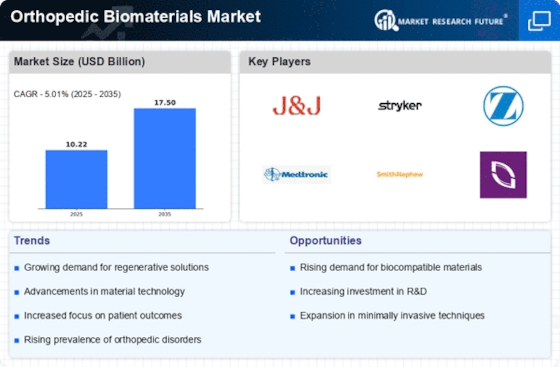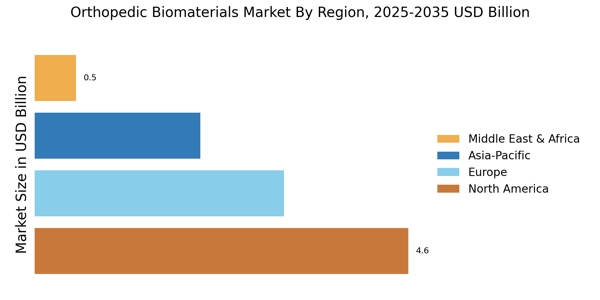Growing Aging Population
The increasing aging population is a pivotal driver for the Orthopedic Biomaterials Market. As individuals age, they often experience a higher incidence of orthopedic conditions, such as osteoarthritis and fractures. This demographic shift is projected to lead to a surge in demand for orthopedic procedures, thereby propelling the need for advanced biomaterials. According to recent estimates, the number of individuals aged 65 and older is expected to double by 2050, which could significantly impact the orthopedic sector. Consequently, manufacturers are likely to focus on developing innovative biomaterials that cater to the specific needs of older patients, enhancing recovery and improving quality of life. This trend underscores the importance of tailored solutions within the Orthopedic Biomaterials Market.
Rising Incidence of Sports Injuries
The rising incidence of sports injuries is a significant driver for the Orthopedic Biomaterials Market. With an increasing number of individuals participating in sports and physical activities, the occurrence of injuries such as ligament tears and fractures has also escalated. This trend necessitates the use of advanced biomaterials for effective treatment and rehabilitation. Reports indicate that sports-related injuries account for a substantial portion of orthopedic surgeries, further emphasizing the need for innovative solutions. As athletes and active individuals seek quicker recovery times and improved outcomes, the demand for specialized orthopedic biomaterials is likely to rise. This growing awareness of injury prevention and treatment options is shaping the landscape of the Orthopedic Biomaterials Market.
Growing Awareness of Personalized Medicine
Growing awareness of personalized medicine is influencing the Orthopedic Biomaterials Market. Patients and healthcare providers are increasingly recognizing the importance of tailored treatment approaches that consider individual patient needs and conditions. This shift towards personalized medicine is driving demand for biomaterials that can be customized for specific applications, such as patient-specific implants and scaffolds. The market is likely to see a rise in the development of biomaterials that can be adapted to the unique anatomical and physiological characteristics of patients. This trend not only enhances treatment efficacy but also improves patient satisfaction. As personalized medicine continues to gain traction, it is expected to play a crucial role in shaping the future of the Orthopedic Biomaterials Market.
Technological Advancements in Biomaterials
Technological advancements in biomaterials are transforming the Orthopedic Biomaterials Market. Innovations such as bioactive ceramics, polymers, and composites are enhancing the performance and longevity of orthopedic implants. For instance, the introduction of nanotechnology in biomaterials has shown promise in improving osseointegration and reducing infection rates. The market for orthopedic biomaterials is projected to grow at a compound annual growth rate of approximately 7% over the next few years, driven by these technological innovations. Furthermore, the development of smart biomaterials that can respond to physiological changes presents new opportunities for the industry. As research continues to evolve, the integration of cutting-edge technologies is likely to redefine standards in the Orthopedic Biomaterials Market.
Increased Investment in Research and Development
Increased investment in research and development is propelling the Orthopedic Biomaterials Market forward. Companies are allocating significant resources to innovate and enhance the properties of biomaterials used in orthopedic applications. This focus on R&D is crucial for developing materials that offer better biocompatibility, mechanical strength, and longevity. Recent data suggests that the orthopedic biomaterials sector is witnessing a surge in funding, with investments directed towards exploring novel materials and technologies. As a result, the market is expected to benefit from breakthroughs that could lead to more effective treatments and improved patient outcomes. The emphasis on R&D underscores the competitive nature of the Orthopedic Biomaterials Market, as firms strive to stay ahead in a rapidly evolving landscape.

















